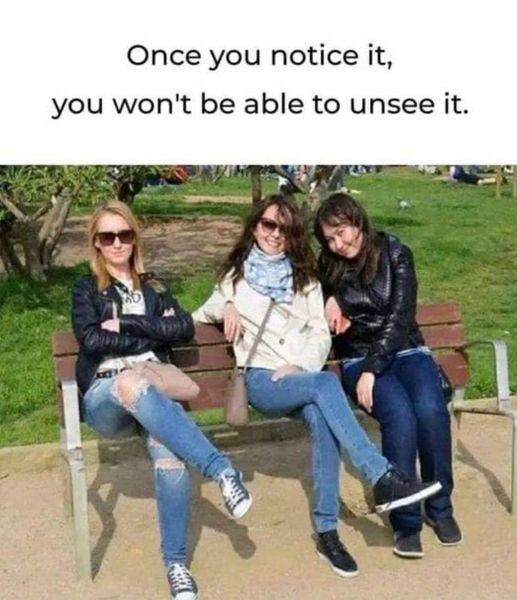
Have you ever glanced at a seemingly ordinary picture, only to later discover a hidden detail that completely changes your perception? Our brains are wired to recognize familiar patterns, which sometimes causes us to overlook anomalies hiding in plain sight. Let’s delve into a fascinating example that challenges our perception and reveals how easily we can miss the obvious.
The Curious Case of the Floating Ladies
At First Glance
Imagine a photograph featuring three women sitting side by side, smiling at the camera. Everything appears normal—a casual snapshot capturing a happy moment. But upon closer inspection, something feels off. Can you identify it?
The Hidden Detail
Take a moment to focus on what the women are sitting on. Notice anything unusual? The truth is, they’re not sitting on anything at all! The image has been cleverly edited to remove the chairs, creating the illusion that the women are floating in mid-air. This subtle alteration plays a trick on our minds, as we naturally assume there must be chairs supporting them.
Why We Miss the Obvious
Pattern Recognition
Our brains are designed to recognize and predict patterns based on past experiences. When we see people in a sitting posture, we automatically assume there’s a chair beneath them, even if it’s not visible. This cognitive shortcut helps us navigate the world efficiently but can also lead us to overlook anomalies.
Dismissal of Improbabilities
Even if we sense something unusual, our brains might dismiss it as irrelevant because it doesn’t fit our expectations. In the case of the floating ladies, the absence of chairs is so improbable that our minds choose to ignore the inconsistency, reinforcing how our perceptions can be easily deceived.

The Value of Puzzles in Sharpening Perception
Enhancing Observation Skills
Engaging with visual puzzles like this one trains our brains to notice details that we might typically overlook. By challenging our pattern recognition tendencies, we can improve our ability to detect inconsistencies and think critically.
Encouraging Open-Mindedness
Puzzles remind us that things aren’t always as they seem. Approaching situations with an open mind allows us to consider alternative explanations and solutions, fostering creativity and adaptability.
Applying These Lessons to Everyday Life
Problem-Solving
When faced with a problem, consider that the solution might be simpler than it appears. By reassessing the situation and questioning our assumptions, we can uncover answers that were previously obscured by our expectations.
Communication
Being aware of how easily perceptions can be skewed encourages us to communicate more clearly and verify information before accepting it as truth. This mindfulness can prevent misunderstandings and promote more effective interactions.
Conclusion
The case of the floating ladies serves as a compelling reminder that the most straightforward secrets often hide in plain sight. By honing our observational skills and challenging our cognitive biases, we can become more perceptive and open-minded individuals. So next time you encounter something that seems ordinary, take a closer look—you might just discover a hidden truth waiting to be unveiled.





